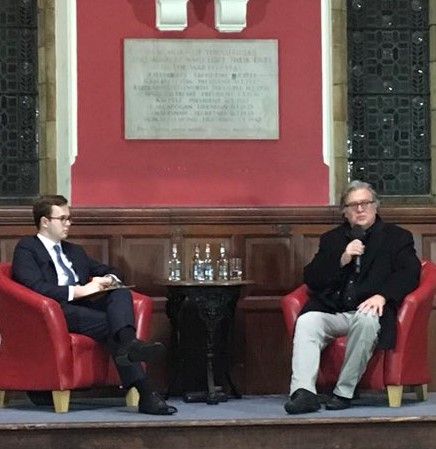Steve Bannon is being amplified, not silenced
By Khaled Diab
By providing Steve Bannon with an uncritical solo platform, the Oxford Union has failed in its mission as a forum of free and fair debate, succumbing instead to tabloid sensationalism.

In June of this year, I received an invitation via e-mail from the Oxford Union, to which I readily agreed, cherishing the idea of engaging with the promising young minds who are drawn to this renowned university.
However, I never heard back from them, which I considered rather unprofessional and impolite. But I kept the matter to myself until I discovered that one of the dates the Oxford Union had proposed to host me on had been given over to one of the high priests of the American far-right and what you might call the emerging Fascists International, Steve Bannon. This followed hot on the heels of an aborted invitation to far-right Alternative für Deutschland leader Alice Weidel, who pulled out after sustained protest.
This double whammy has prompted me to speak out.
As anyone who knows me or reads my work is aware, I am a passionate advocate of free speech, but this is not a free speech issue, since conservative, middle-aged, wealthy white men remain the most over-represented group in the public spaces of the Western world, no matter how much they protest to the contrary.
Moreover, Steve Bannon is not a silenced voice who has had his freedom of expression curbed or curtailed. Bannon has built a career saying what he wants, when he wants and has not paid any price for it, not even for his most hateful and untrue pronouncements. Quite the contrary, he has been handsomely rewarded.
Bannon carved out a prominent position for himself in the American far-right movement, which he helped navigate towards the mainstream during his stewardship of Breitbart, the website which created a toxic brand of “news” which erased the line between fact and fiction, propagating a plethora of conspiracy theories, about Muslims, Mexicans, immigrants, women, the gay community, the mainstream media, and the man they regarded as the demon-in-chief, Barack Obama.
During the US presidential campaign, Breitbart threw its fantasy-weaving expertise behind Donald Trump, spreading destructive conspiracy theories, including the infamous ‘Pizzagate' myth, which helped pave the way for not only Trump to enter the White House and make it white again, but for Bannon to join him. Even now that Bannon has been unceremoniously ditched by Trump, he has no shortage of far-right and mainstream platforms hosting him, as he himself noted during his Oxford Union address.
Rather than hosting an already overexposed Bannon, the Oxford Union should have followed through with their invitation to me or any other progressive Arab or Muslim, given the very real sidelining or drowning out of our voices by extremists, both in the Middle East and in the West. This is important both to show that there is a big, wide world beyond extremism, and also to place extremism in its broader context.
To my mind, Steve Bannon no more represents the white Christian mainstream than salafist firebrands represent the mainstream of European Muslims, yet both are given public exposure way beyond the fringes for which they speak by the segments of the media which thrive on sensationalism and baiting audiences.
Instead of living up to its reputation as a forum for genuine debate, the Oxford Union has succumbed to this tabloid sensationalism. This was reflected in the OU's decision to allow Bannon to speak alone, uninterrupted and unhindered until the final Q&A.
If the debating society was genuine in its stated aim of holding his views up to scrutiny, then it should have invited capable and knowledgeable speakers to argue against Bannon, as occurred when Nigel Farage was invited to discuss Britain's membership of the EU, back in 2015. It would have also been handy to have an expert and impartial fact checker on hand to wade through the many deceptions Bannon delivered during his talk and in the past.
OU president Stephen Horvath proved woefully ill-equipped for the task, and only managed to ask a handful of meek, sometimes incoherent questions – a performance which, along with the chosen format, has led many fellow students to demand Horvath's resignation.
Steve Bannon's long speech was cleverly designed to appeal, like far-right rhetoric often attempts to do, to the economic anxieties of the young students in the audience. He railed against the “Davos” and “Brussels” elites who created what he described as “extinction-level events” – the rise of China, the trillions spent on wars in the Middle East and the 2007/8 financial crisis – which had turned the working class into angry “deplorables”. Bannon described Donald Trump as the symptom of these trends and not their cause.
This is disingenuous deception on so many levels, and Horvath did little to challenge it. As I have observed before, the rise of Trump and of the populist right is not a symptom of growing economic anxiety and inequality in itself, but a symptom of the narratives which blame, as Bannon does, minorities, the struggle for racial equality, migrants, Muslims, feminists and leftists, amongst others, for these challenges, and which whip up anxiety about diminishing privileges among the dominant groups in society.
Moreover, Bannon failed to explain or even mention how, if it is working-class anger that led to the rise of Trump, why it is that Trump voters were generally better-off than those who voted for Clinton, gaining about half the votes of people earning over $50,000, with many very wealthy people voting for Trump. The average Trump voter is, in fact, middle-class, white and Christian.
Bannon also failed to back up his claim that Donald Trump, who is himself a member of the economic elite that Bannon so rhetorically despises, has served the interests of the “deplorables”. In reality, Trump's tax cuts and inflated military spending, classic Republican and neo-conservative policies, have served to enrich tycoons like him and rich corporations, first and foremost, followed by the 1%, while making life harder for the middle- and working-classes, not to mention for future generations.
Rejecting the ethno-nationalist label, likely in a bid to appeal to his multicultural audience, Bannon went on to claim he was an economic nationalist and that “economic nationalism doesn't care about your colour, ethnicity, your religion, your gender, your sexual preference.” Despite his protestations, Bannon has this incredible knack for making friends and forging alliances with feverishly ethno-nationalist parties and fascists. Moreover, Breitbart became a hotbed of white nationalism during Bannon's tenure.
Steve Bannon's comments on religion rang equally hollow and disingenuous. He claimed that both he and Trump were not Islamophobes, because they had nothing against Muslims, their beef was with Islam – a typical far-right defence which I analyse in my book Islam for the Politically Incorrect.
As an atheist, I have no beef against people criticising Islam, but Bannon is not some impartial or balanced critic, as I explain in my book. He believes that the West is “at the beginning stages of a global war against Islamic fascism” that is set to “completely eradicate everything that we've been bequeathed over the last 2,000, 2,500 years,” Bannon told a conference hosted by a conservative Catholic organisation, held in the Vatican in 2014.
Bannon is also convinced that there exists an age-old cosmic clash between Islam and Christendom, and that secularism has hobbled the West's ability to face this supposedly existential threat, leading him to wax nostalgic about recreating a past of noble crusaders in which “our forefathers kept their stance, and I think they did the right thing. I think they kept [Islam] out of the world, whether it was at Vienna, or Tours, or other places.”
As this brief exposé shows, providing a prestigious platform to a conspiracy theorist without robustly challenging the fictions he has weaved – that we are embroiled in a world war that does not exist, and that the West is losing the battle because it is no longer Christendom – is reckless and irresponsible, especially in light of the dangerous rise in violent far-right extremism.
This is not only because these claims are demonstrably untrue but also because, like jihadist ideology, Bannon's apocalyptic vision divides the world into two groups of enemies, the near enemy, i.e. the strength-sapping kryptonite of secularism (aka liberals, leftists, feminists, ethnic minorities, LGBT activists, environmentalists, etc.) and the far enemy, mostly Islam.
In this uncompromising vision, the only people who are right are the self-righteous of the American and European far-right, and to hell with the rest of us.
____
This article was first published by The New Arab on 28 November 2018.


